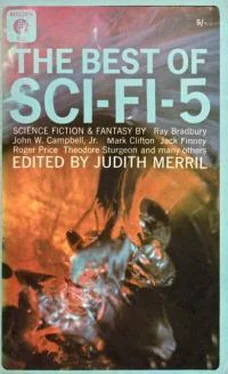Then there were the “Adventures of the Mind” series in The Saturday Evening Post ; the series of articles on ESP, space travel, and chemical warfare, in Harper’s ; and the increasingly fruitful “SR/Research—Science and Humanity” monthly section in the Saturday Review .
People—the general public—are getting used to the idea that hurt so hard when the first Sputnik blew the roof off: that there is precious little we know, and precious much to be learned; and that science is a method—not an authority.
Because the academicians, politicians, and spokesmen in general always learn more slowly (being already so stuffed with knowledge), it may seem that this kind of “s-f thinking” is making slow headway; but watch the cartoons in your newspaper or weekly magazine—listen to the new gags— check the number of fantasy or s-f themes in TV shows—in pop songs—
That mass readership is going to be ready for good (but don’t call it) science fiction sooner than most of us have believed.
* * * *
The changes in this year’s S-F are obvious—or some of them are. The title, date of publication, size, and price, you’ll have noticed by now; also the dropping of the controversial special non-fiction section. There will be more changes next year, I hope; this year, the change in publishing arrangements came too late to do much about adding some of the material I hope to use hereafter.
Special mentions for 1959, besides those regularly included in the short-story honor roll, should be given:
For verse and poetry: to F&SF , especially the contributions by Hilbert Schenck, Jr., and Gordon Dickson; and to Prof. Theodore R. Cogswell and his confrères in the Publications of the Institute of Twenty-First Century Studies.
For novels in the magazines: to Gordon Dickson’s explosive “Dorsai!” ( Ast , May-July), Everett E. Cole’s “The Best Made Plans,” ( Ast , Nov.-Dec.); and the magazine version of Pat Frank’s “Alas, Babylon” ( Good Housekeeping , March).
For novels in book form: to Kurt Vonnegut’s The Sirens of Titan (Dell); John Brunner’s Echo In the Skull (Ace); and Theodore Sturgeon’s Cosmic Rape (Dell).
For the short story reprints in the Kornbluth Marching Morons (Ballantine); Sturgeon’s Aliens 4 (Avon); and Anthony Boucher’s giant two-volume anthology, A Treasury of Great Science Fiction (Doubleday).
And above all, for well-worded clear thinking about the troubles, needs, and satisfactions of the (science fiction?) field, the volume, The Science Fiction Novel (Advent), edited by Basil Davenport, and with papers by Robert A. Heinlein, C. M. Kornbluth, Alfred Bester, and Robert Bloch.
—J. M.












